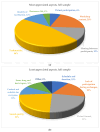Targeted Transition Readiness Workshops for Pediatric Brain Tumor Survivors: Feasibility, Acceptability, and Preliminary Effects
- PMID: 39851950
- PMCID: PMC11763518
- DOI: 10.3390/curroncol32010034
Targeted Transition Readiness Workshops for Pediatric Brain Tumor Survivors: Feasibility, Acceptability, and Preliminary Effects
Abstract
Pediatric brain tumor survivors (PBTS) are at risk for late effects related to their diagnosis and treatment. Long-term medical follow-ups are deemed essential, implying a transition from pediatric to adult healthcare settings. This pilot study aims to assess the feasibility, acceptability, and preliminary effects of a targeted transition readiness intervention for PBTS. The program consisted of three hybrid workshops that targeted disease-related self-management skills, social skills, and cognitive functioning, as well as parallel workshops for their caregivers. The feasibility and acceptability were assessed through recruitment, retention, and satisfaction rates. Preliminary effects were primarily assessed via a pre/post assessment of transition readiness skills using the Transition Readiness Assessment (TRAQ) questionnaire. Among the eligible dyads, 12 (38%) consented to participate. Ten dyads participated in at least two workshops, and six dyads participated in all workshops. Overall, the participants were satisfied with the intervention (parents = 86%; PBTS = 73%). Although not statistically significant, a clinically relevant post-workshop increase in transition readiness skills was observed for PBTS (d = 0.36) and their caregivers (d = 0.25). The results suggest the relevance of the intervention and encourage further developments. Adjustments are needed to optimize reach and efficacy. The workshops have the potential to be adapted to be more accessible and shorter.
Keywords: pediatric brain tumor; pilot studies; survivorship; transition readiness.
Conflict of interest statement
The authors declare no conflicts of interest. The funders participated in the recruitment of participants by publishing a poster with details of the project on their social media platform. They had no role in the design, analyses, interpretation of data, writing of the manuscript, or in the decision to publish the results. They also did not have access to data from the study.
Figures
References
-
- Perreault S., Desjardins L., Coltin H., Scheinemann K. Long-Term Sequelae. In: Scheinemann K., Bouffet E., editors. Pediatric Neuro-Oncology. 2nd ed. Springer; New York, NY, USA: 2024. pp. 405–424.
MeSH terms
Grants and funding
LinkOut - more resources
Full Text Sources
Medical


